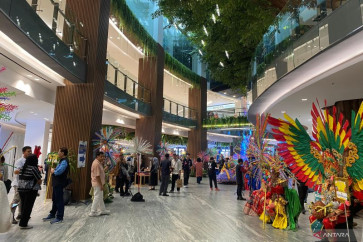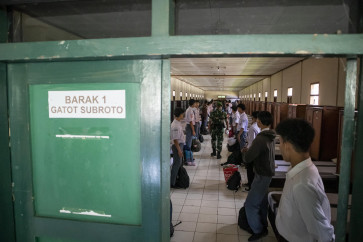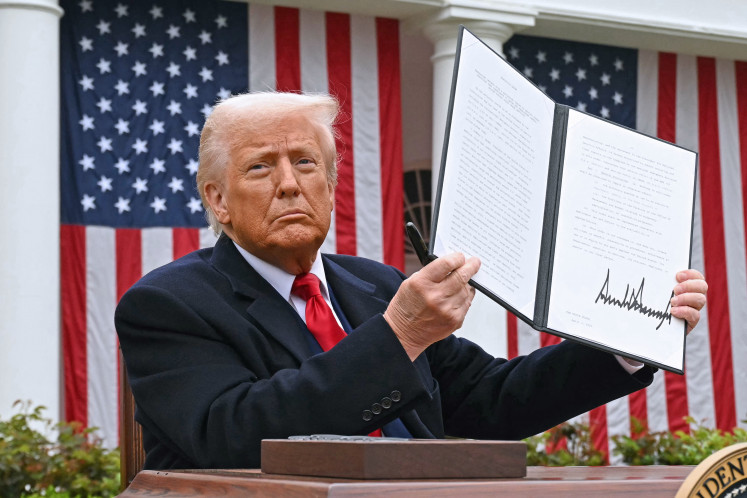Insurance and derivatives for stability and sustainability
Recent volatility in commodity prices has hit not only commodity producers but also the world economy as a whole
Change text size
Gift Premium Articles
to Anyone

R
ecent volatility in commodity prices has hit not only commodity producers but also the world economy as a whole.
Toward the end of World War II, a conference was held in Bretton Woods. The conference established the foundation for the post-war international financial order. The Bretton Woods strategy addressed what was believed to be the main cause of the pre-war economic downturn: the lack of stable financial markets in the world that in turn led to the war.
The International Monetary Fund (IMF) would aim to stabilize global financial markets and national currencies while the World Bank, which was then titled International Bank for Reconstruction and Development, would rebuild Europe. Now the World Bank has shifted its focus to developing countries.
As of 2015, the IMF manages funds valued at US$334 billion in quotas and $903 billion in pledges while the World Bank has equity of $38.6 billion with assets of $343.2 billion. Seen from the figures, both the IMF and the World Bank are small in terms of the funds they manage compared to private wealth, which Bain reported reached $600 trillion in 2010 and is projected to rise to $900 trillion in 2020.
Reports from Bain have argued that the world is awash in capital. Could this be why the central banks of advanced countries are keeping their interest rates very low? But why do developing countries lack funds for infrastructure construction?
From the other side, funds located in insurance corporations the world over are much higher than the funds under the control of the IMF and the World Bank. In 2014, the total premiums of all insurance stood at $4.78 trillion. By an estimation based on their total premiums, global assets would be around $52 trillion. Insurance is in fact the largest industry in the world.
Insurance is a financial instrument designed to protect business from losses due to dire events by paying a yearly premium. Another financial instrument is a derivative. Derivatives developed quickly following financial innovations in the 1970s. These two instruments have different characteristics but could substitute one for the other in a suitable circumstance. Occasionally, a hedge by derivatives could cost less than insurance coverage.
The collapse of commodity prices has provoked an unstable global financial market, weakening the world economy and leading to significant reductions in global trade. This means that hedging and insurance have not been sufficiently used to hedge for a downfall in commodity prices.
If a person or a corporation is able to protect themselves from financial calamity, why should a related country or corporation not do the same for commodity price risks? A number of instruments are there to be employed, either from insurance or from derivative products. These instruments could produce a more stable operation of all businesses and lead to world economic stability.
Drawing lessons from World War II, a lack of financial market stability could trigger worldwide tension. The present global economic rout could be lurking underground, provoking the geopolitical tensions in the South China Sea.
Insurance is an instrument for managing risk. The price risks of commodities could be managed by employing a mix of insurance contracts with derivative instruments. Presently, people are talking about the role of financial instruments in building up a sustainable global economy. Sustainability is not only related to environmental problems but also to the stable working of the world economy.
The present commodity collapse is really a form of history repeating itself. Forward or futures contracts could create stability for a certain period and reduce uncertainties in running business. Overlapping stable periods provided by insurance and derivatives will create a larger stable working space for all business activities. This is a new innovation.
The present financial system provides many new instruments that are capable of reducing or protecting people from financial losses. But the system is still lacking in coverage due to lags in public policy or the insufficiency of awareness in society.
There should be a man-made system to avoid the wild volatility that we have experienced.
Considering the funds under the Bretton Woods Institutions and the Insurance groups, it is clear that the latter manages a bigger amount of funds than the former, despite the fact that it has hundreds of sovereign states as members. The power of the people is much stronger than the power of the sovereign states. The insurance and the derivatives industries providing protection could more easily penetrate society because they are closer to the direct interests of regular people.
How about Indonesia?
Expanding insurance will provide more funds for protection. It will also benefit the public and private investment sectors. The more the participants, the less cost for premiums.
This is a public good and wider participation will eventually benefit more people. Demand is growing but the financial infrastructure is lacking. Special efforts must be intensified to disseminate this scarce knowledge to a wider audience.
___________________________________
The writer is a lecturer at the University of Indonesia's School of Economics, Jakarta.









